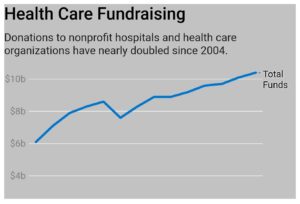
Russell Roberts recently interviewed Dr. Keith Smith on the EconTalk podcast where they discussed many of the current problems driving the cost of American health care. In the final segment, Roberts asked the inevitable question that all advocates of the free market receive: “What about the poor?” One commenter on the show’s webpage added, “Obviously the current system is a gigantic disaster, but the real question to convince people of is: why the inefficiencies of a single-payer system are not worth it, to provide care for the very poor.”
Dr. Smith’s answer was brilliant and is worth repeating:
“One way to think about this is that, at current prices, we’re all poor. And the only way to bring–the only way to bring prices down without sacrificing quality in every other industry and market that is known to man is market competition. We believe that as market competition is not thwarted but actually encouraged, or not hamstrung by the players in the industry now, and as there’s more market competition, prices will fall so dramatically that the number of individuals for whom a partial or complete lack of funds is an issue, it dwindles–it becomes very, very small. For that group of patients, we believe the answer is to be charitable.”
In this article, I would like to elaborate on Dr. Smith’s comments and add some additional perspectives regarding the current philanthropic landscape and how it relates to the charitable aspects of medical care.
First of all, the very term “poor” is subjective to each individual. Politicians, economists, and policy wonks often aggregate individuals and households under a particular income range as “poor”, but as Dr. Smith points out, if someone cannot afford something, labels are meaningless. The question should be “Why are individuals unable to afford medical care who would not be considered poor by any other standard?” This brings us back to the basic premise that the cost of medical care has been drastically inflated to the point that few can afford it without financial assistance.
This is where politicians love to play on the inherent empathy of individuals who want to help the less fortunate. They devise numerous programs under the guise of “helping the poor”, disregarding the role government intervention has played in making most of us “healthcare poor”. The free market has never been allowed to work in medicine. The history of American medicine is one of increasing government subsidies that fuel demand alongside crony capitalist privileges that restrict competition. The policies are then followed by more interventions, mandates, and regulations that ultimately lead to even less competition and higher costs.
I spent more than ten years in philanthropic fundraising working with individual, corporate, and foundation donors to higher education. Like Dr. Smith who chose to leave corporate medicine because he felt like an “accessory to a crime”, it eventually became clear to me that I was asking individuals to support institutions that were overpricing their services above what a true free market education would cost. They can get away with this because the federal government artificially drives demand through grants and student loans while state governments subsidize millions in capital resources and salaries for academics and administrators who could never make six-figure salaries for their knowledge in the free market. (No doubt why so many academics love the state and its benefits).
It is no coincidence that this narrative sounds eerily familiar to the medical-industrial complex where prices have skyrocketed in the absence of market constraints. The two areas where the government is the most involved in “helping” are the most expensive. Funny how that works. It is painfully obvious why no government school would ever require students to read Henry Hazlitt’s “Economics In One Lesson”.
Education and healthcare are also two areas where individuals and corporations are the most philanthropic. In 2018 Americans gave away a total of $428 billion, with 14% of that going to education and 9% to health. Individuals give more than $650 million annually to medical campaigns on GoFundMe, not to mention the unreported millions that are raised through private fundraisers through communities and churches. Imagine how far your scholarship donation to your alma mater would go if tuition rates held closely in line with general inflation. How much more could a charitable contribution assist someone with medical bills that were 40% lower? It would be much easier for friends, family, or church members to help with your $3,500 bill at the Surgery Center of Oklahoma than the $30,000 bill you receive from a facility with no price transparency.
Like “nonprofit” institutions of higher education always claiming to be poor and in need of more funding, the tax-exempt hospitals make the same claim to individuals and corporations in order to solicit more funds while they pay their CEOs millions. Donations to hospitals now exceed $10.4 billion annually according to the Association for Healthcare Philanthropy. In 2013 privacy laws were changed to allow your personal records to be shared with hospital fundraising staff. You probably agreed to this in one of those pages of documents you signed without reading the fine print. This allows hospitals to research public records to develop “grateful patient” programs to give some extra special treatment to potential future donors. If you are sufficiently wealthy, you will likely have at least one hospital executive come by to check in on you.
So it appears that private charity is already providing billions annually for “healthcare”, but what if all those funds were going directly to help people in need? A market-based system that brings down prices through competition would drastically reduce the amount needed to assist people who truly cannot afford medical services. Then private charity could identify those real needs and eliminate the gap. Perhaps there would be true non-profit charitable medical facilities again. I seriously doubt you will receive a fundraising letter from your local hospital asking for support to help patients pay their bills anytime soon.
